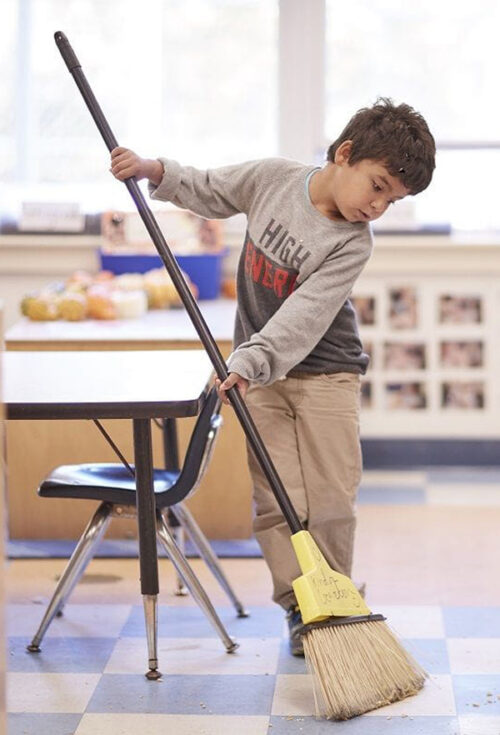Parenting: Good behavior is expected, not rewarded
Good behavior expected not rewarded
Children’s Good Behavior
Expected NOT Rewarded
by Gregory A. Barrett, M.D.
Creating a healthy, positive family life is an admirable aim for parents, and tricks of the trade do exist in achieving this end. Two such secrets of success are family meals and assigned chores. They are simple and yet incredibly important factors in developing and maintaining an effective family dynamic. However, neither of these happen by accident. Mothers and fathers have to make a concerted, focused effort to make them a priority or they will not materialize. The temptation will always be there just to perform the household tasks yourself, or grab some fast food, and that will be the beginning of the end for the good intentions.
There was a moment many years ago in our family that qualified as a seminal event. I was riding shotgun one evening, my spouse the wheelman, as we drove to the local McDonald’s to pick up a quick meal for us and the kids. After placing the order at the drive-through the scratchy intercom voice inquired, “Is that you?”, correctly identifying the driver by her first name. My wife acknowledged that it was indeed.
“Do you know this person?” I asked as we pulled the car around to the pick-up window.
“Well, not exactly,” she answered evasively.
“Eleven forty-five,” said the smiling face at the cash register. “Say, how did your conferences go the other night?”
“Pretty well,” my better half, an elementary school guidance counselor, replied while sliding her a ten and two ones.
“Oh, good. You’ve had quite a week, haven’t you? Here’s your change. See you later, Mrs. Barrett!”
Hmm, I thought to myself.
“She seems to know your business pretty well,” I commented on the way home. “How is that?”
“Oh, I suppose from just picking up stuff there,” she said with a shrug.
“Do you mean from all the times you’ve gone to McDonald’s?”
“Yeah, I guess….”
Omiword, was it possibly true that we had become such frequent flyers at the Golden Arches that my wife’s voice was recognizable through the static of the fast-food restaurant intercom? That could not be good. Upon arriving home, we did some math and discovered to our horror that this was the fourth consecutive meal (yes, the FOURTH consecutive meal!) we had purchased at McDonald’s. Yikes! This was an extremely unsettling revelation, kind of like looking at your picture when you renew your driver’s license – only worse.

Sure, both of us worked, but that was no excuse. We sat down that night and had a serious talk, began to plan our meals a week in advance, and thankfully none of my family has as of yet had a major cardiac event resulting from our laziness.
Good Behavior Secret—Family Dinner
The benefits of the family meal are nutritional, psychological, and behavioral. First and foremost is the simple forced encouragement of family interaction. It is very easy in these days of two working parents for families to splinter into factions so separate they hardly know each other. If you are at least sitting down to dinner with some regularity – and I would define this as a minimum of at least five times a week – you will be staying in contact. The literature strongly suggests a direct link in adolescent girls between infrequent family meals and eating disorders. Anorexia nervosa is much more difficult to detect if no one observes the child’s pattern of eating. Studies have also shown that family mealtimes are rituals which lead to better school performance and less suicidal ideation, violence, and substance abuse. Resisting negative peer pressure is enhanced tremendously if you regularly break bread together.
A family meal should take place with everyone seated in actual chairs at the dinner table, not in front of the television. Sitting around watching the tube and eating off TV trays does not foster the togetherness and socialization which are the key elements one is seeking. Eating while watching television is a proven contributor to the current obesity epidemic. It is thus important to establish a rule that television viewing and snacking should be separate, independent events. And importantly this admonition about television equally applies to cell phones. The jangling of an incoming call or message which must be immediately processed defeats the whole purpose. Establish a simple house rule that all phones must be turned off during dinnertime. No exceptions. And parents, you must lead by example.
TV in Bed

A tangential question to be raised at this point is whether any of your children have a television in their bedroom. To those of you who answered in the affirmative, may I respectfully ask, what are you thinking? Are you nuts?!? What possible benefit do you believe could come of this? Get the TV out of there, for goodness sake, and right now! I’m actually not too crazy about a child having a computer in their bedroom, either. To me a video screen is a video screen. Granted, in the twenty-first century that may be asking a bit much. However, the point is a bedroom should be the place where one sleeps. It is not a room equipped with multiple entertainment devices to distract him or her from the task at hand, which is, of course, sleeping.
There seems to be no concept of the passage of time when a child is seated in front of a computer screen. I frequently see patients in my pediatric practice who are literally devastated by exhaustion from lack of sleep directly caused by playing on the computer late at night. And equally important, for similar reasons, cell phones need to be re-charged in the kitchen overnight. Trust me, there are a substantial number of teens completely worn out by the constant texting which goes back and forth between midnight and seven AM. Do them a favor and remove the temptation.
For the family dinner to be optimally beneficial there are a few additional items to be stressed. Number one, it would be ideal if the meal itself were actually prepared in your kitchen. Takeout is okay once in a while for special occasions, but if every dinner is carryout then you are losing all of the nutritional advantages. Restaurant food virtually without exception will be much richer in fat and salt content than almost anything one cooks at home. Bonus points are awarded, by the way, for every additional family member who is involved in either meal preparation or setting the table. The more involved, the merrier – and the more productive.
Keep It Pleasant

Secondly – and this is very crucial – mealtimes should be kept pleasant. If you have really hot button topics which put everyone’s hair on end you must wait patiently until the meal is over before you go after each other. Limit the subjects for discussion during these times to those which are generally noncontroversial and agreeable. Now if it is possible for you to conduct yourselves civilly and respect each other’s opinions the dinner table is an outstanding place for discussing politics and current affairs, but certain ground rules need to be obeyed. No one should be allowed to become so upset that they are throwing their napkin in the air and storming off to their room.
And lastly, remember, the purpose of the meal is not only that you eat at the same time, but that you actually talk to each other. No cell phones, no magazines, no iPods, et cetera. Make that a rule written in stone.
A couple of months back I witnessed a family of four eating dinner at a little patio table outside the local sub shop. True, it wasn’t a home-cooked meal, and they weren’t sitting around the dining room table at their home, either. But at least they were eating together, which was a good thing. Or so I thought, until upon closer inspection I realized that ALL FOUR of them, mom, dad, brother, and sister, were simultaneously munching on their sandwiches while talking on their cell phones. Unbelievable, but true. Any advantage of the family meal was thus completely wasted.
Several years ago I attended a conference where the lecturer, a clinical psychologist, told a story about a very affluent family of five he was counseling. They lived in a large home, each of the parents and all of the kids had their own television sets, and the family members usually spent their evenings in separate rooms by themselves simultaneously watching TV. Well, that happens, does it not?

But the fascinating point about this particular family was that he discovered upon inquiry that typically they were all viewing the identical show at the same time! This is the very definition of a family who has lost touch. And family meals are an invaluable and irreplaceable way for the unit to stay in contact and/or to re-connect.
Good Behavior Secret—Assigned Chores
Assigned chores are nearly as important in creating a healthy family dynamic, but in a different way. The reality in this world is that almost everyone will eventually need to get a job, and it is a good idea to begin to instill an appropriate work ethic at an early age. As to how early my answer is very early indeed, even as young as toddlers. It may be as simple as picking up their toys or helping Mommy give the younger sib a bath, but the earlier it becomes an expectation the better.

The chores should be clearly defined and spelled out to the child. Don’t ask your child if he or she can empty the dishwasher. Rather, simply inform whomever is assigned that job that the dishes are clean. If this becomes an established part of your home from an early time your child will not only accept it but usually being responsible will become a point of pride for them. They will actually get a sense of accomplishment and enjoyment out of completing their tasks. This will pay great dividends in later years when it comes time for your children to enter the workplace.
Understanding the concept of expectations is critical to parenting. You must establish expectations for your children even when they are very young, and then in an age-appropriate fashion continue to ramp them up periodically during childhood. If you have questions regarding what is age-appropriate your pediatrician should be a valuable resource. One of the major problems I continually see in this regard is the parent chronically underestimating what their child can do. Oftentimes children are capable of much more than one would imagine.
Start expecting more and start rewarding less. This brings up an extremely crucial concept of parenting which must be understood, the title of this essay repeated here for emphasis: GOOD BEHAVIOR IS EXPECTED, NOT REWARDED
Some parents have a chronic tendency to overreact and become overly excited about the most basic behaviors of their children which clearly should have been expected. This style of parenting may be appropriate to training a seal at Sea World, but it IS NOT an appropriate way to raise a child.
Are You Training Seals Or Kids?

“Jonathon, you didn’t bite Dr. Barrett today like last time!” smiles the solicitous mother.
“Good boy, you can have a sticker. I’m so proud of you! And you didn’t even spit at him! Why, you little darling, I think you deserve some ice cream! Now, you shouldn’t have kicked him in the shin, so let’s try not to do that the next time. Do you think you could do that for Mommy? You maybe shouldn’t have called him all those bad names, either. And it wasn’t really nice when you hit your little sister over the head with your Transformer. But Jonathon, you have been such a good boy, I’ll take you to the toy store when we leave here. I am so proud! What kind of new toys would you like?”
Expect good behavior. Come on, up the ante here folks! Do not underestimate the power of simply expressing your disapproval. And don’t ever forget that secretly your child wants to please you, to make you proud, so make use of it. Acting like a human being does not warrant a reward, and there will be no change in Jonathon’s conduct until his mother and father alter their approach to parenting.
The two secrets revealed here are huge. Home-cooked family meals are healthier, and dinnertimes keep families connected. An uncountable number of the ills of childhood and society can be avoided simply by planning in advance, sitting around the dinner table, and interacting.
Assigned chores will result in making your child feel like a valued member of the family. They can be an indispensable step in his or her becoming an independent, responsible adult. Remember, children tend to live up to or down to your expectations. You want better behavior? Then expect better behavior. And it’s never too early to start.
Expect more and you’ll get more. It really is that simple.
☤


